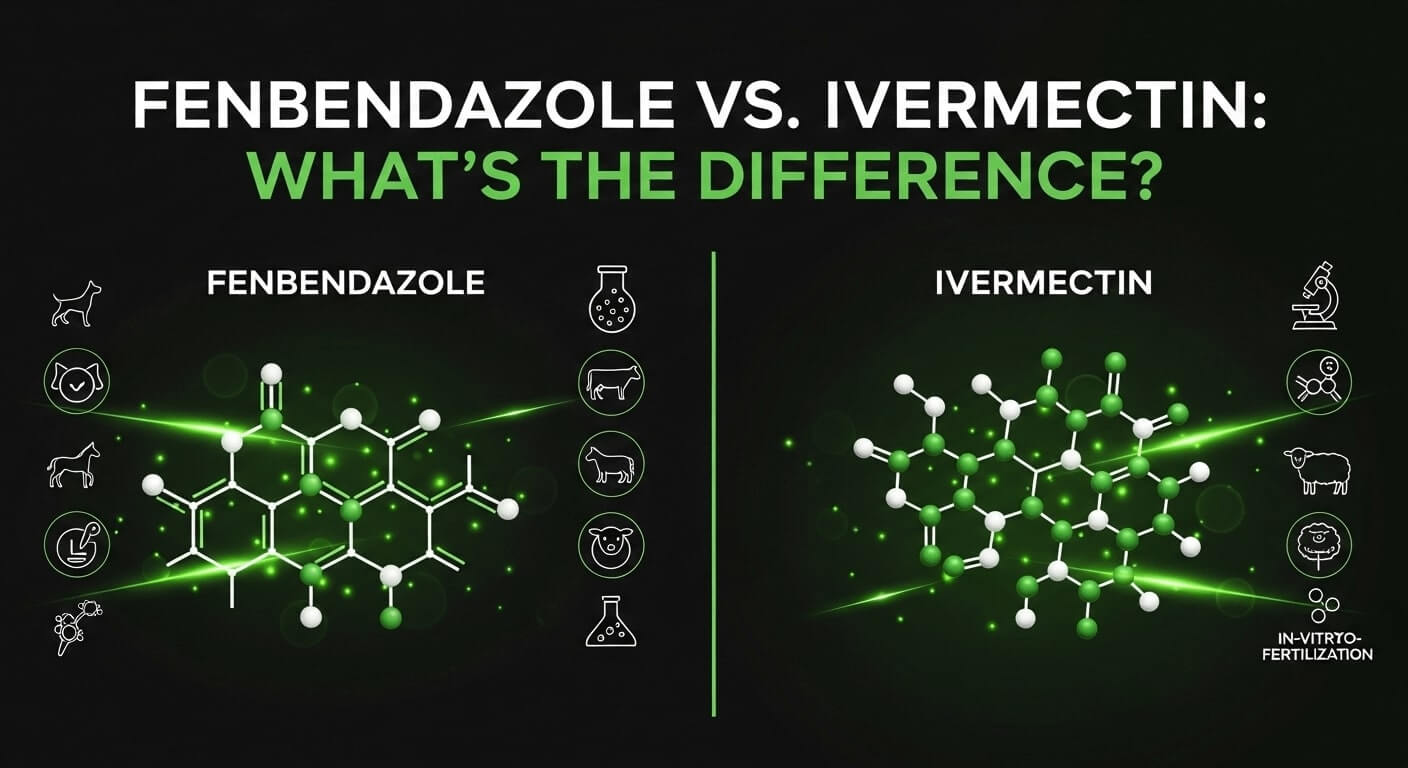
When it comes to antiparasitic medications, fenbendazole and ivermectin are two widely discussed drugs. Both are effective against parasites but differ in their mechanisms, uses, and safety profiles. If you’ve ever wondered, “What is the difference between fenbendazole and ivermectin?”, this comprehensive guide will break down their key distinctions, applications, and considerations.
Introduction to Fenbendazole and Ivermectin
Before diving into what is the difference between fenbendazole and ivermectin, it’s essential to understand what each drug is and how they function.
- Fenbendazole is a broad-spectrum benzimidazole anthelmintic used primarily in veterinary medicine to treat gastrointestinal parasites like roundworms, hookworms, whipworms, and some tapeworms. It works by disrupting the parasites’ energy metabolism, leading to their death.
- Ivermectin is a macrocyclic lactone antiparasitic that belongs to the avermectin family. It is used in both humans and animals to treat a variety of parasitic infections, including river blindness (onchocerciasis), strongyloidiasis, and scabies. It works by paralyzing and killing parasites through neuromuscular interference.
Now, let’s explore what is the difference between fenbendazole and ivermectin in greater detail.
1. Mechanism of Action
One of the primary differences between fenbendazole and ivermectin lies in how they combat parasites.
- Fenbendazole inhibits the polymerization of tubulin in parasitic cells, disrupting their microtubule structure. This prevents glucose uptake, starving the parasites of energy and leading to their eventual death.
- Ivermectin, on the other hand, binds to glutamate-gated chloride channels in nerve and muscle cells of parasites. This hyperpolarizes their cell membranes, causing paralysis and death. It is particularly effective against nematodes and arthropods.
Understanding what is the difference between fenbendazole and ivermectin in terms of mechanism helps explain why they target different types of parasites.
2. Spectrum of Activity
Another critical aspect of what is the difference between fenbendazole and ivermectin is their range of effectiveness.
- Fenbendazole is mainly effective against:
- Gastrointestinal roundworms (nematodes)
- Some tapeworms (cestodes)
- Certain protozoans (e.g., Giardia in some cases)
- Ivermectin has a broader spectrum, targeting:
- Nematodes (roundworms)
- External parasites like mites and lice
- Filarial worms (e.g., those causing river blindness)
- Some arthropods (e.g., scabies mites)
While both drugs are antiparasitic, ivermectin covers a wider range of parasites, including external ones, making it more versatile.
3. Approved Uses in Humans vs. Animals
A significant point in what is the difference between fenbendazole and ivermectin is their approved applications.
- Fenbendazole is primarily a veterinary drug, approved for use in:
- Dogs (e.g., Panacur)
- Cats
- Livestock (cattle, sheep, pigs)
- It is not FDA-approved for human use, though some people use it off-label.
- Ivermectin is approved for both humans and animals:
- Human formulations treat onchocerciasis, strongyloidiasis, and scabies.
- Veterinary formulations are used for heartworm prevention and parasite control in livestock and pets.
This distinction is crucial when considering what is the difference between fenbendazole and ivermectin for medical or veterinary purposes.
4. Safety and Side Effects
When evaluating what is the difference between fenbendazole and ivermectin, safety profiles must be considered.
Fenbendazole Safety
- Generally well-tolerated in animals.
- Rare side effects may include vomiting, diarrhea, or lethargy.
- No known severe toxicity in humans at veterinary doses, but long-term safety data is limited.
Ivermectin Safety
- Safe when used at prescribed doses in humans and animals.
- Potential side effects include dizziness, nausea, and skin rash.
- Toxicity risk if misused (especially with veterinary formulations in humans).
- Can cause neurological effects in certain dog breeds (e.g., Collies) due to genetic sensitivity.
Thus, what is the difference between fenbendazole and ivermectin in safety largely depends on proper dosing and species-specific considerations.
5. Resistance and Efficacy
Another factor in what is the difference between fenbendazole and ivermectin is parasite resistance.
- Fenbendazole resistance has been reported in livestock parasites due to overuse.
- Ivermectin resistance is emerging in some nematodes, particularly in livestock and human parasites like Strongyloides.
This highlights the importance of rotating antiparasitic drugs to prevent resistance.
6. Off-Label and Alternative Uses
Beyond their primary uses, what is the difference between fenbendazole and ivermectin in alternative applications?
- Fenbendazole has gained attention in cancer research due to anecdotal reports of antitumor effects, though clinical evidence is lacking.
- Ivermectin was controversially promoted for COVID-19, but major health organizations do not recommend it due to insufficient evidence.
These off-label uses remain unproven and should be approached cautiously.
7. Dosage and Administration
Dosage is another key aspect of what is the difference between fenbendazole and ivermectin.
- Fenbendazole is typically given orally for 3–5 days in animals. Human use (if any) is not standardized.
- Ivermectin dosing varies:
- Humans: Single or multiple doses depending on the infection.
- Animals: Monthly preventatives (e.g., heartworm prevention in dogs).
Conclusion: What is the Difference Between Fenbendazole and Ivermectin?
In summary, what is the difference between fenbendazole and ivermectin can be broken down into:
- Mechanism: Fenbendazole disrupts energy metabolism, while ivermectin causes paralysis.
- Spectrum: Ivermectin covers more parasite types, including external ones.
- Approval: Fenbendazole is veterinary-only; ivermectin is used in humans and animals.
- Safety: Both are safe when used correctly, but ivermectin has more documented human use.
- Resistance: Both face resistance issues in certain parasites.
Understanding what is the difference between fenbendazole and ivermectin helps in choosing the right treatment for parasitic infections. Always consult a healthcare or veterinary professional before use.
By now, you should have a clear answer to what is the difference between fenbendazole and ivermectin. Whether for pets, livestock, or human health, knowing these distinctions ensures safer and more effective parasite control.


Comments (0)
Leave A Comment